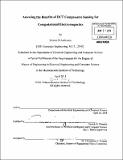| dc.contributor.advisor | Patrick H. Winston. | en_US |
| dc.contributor.author | D'Ambrosio, Kristie (Kristie L.) | en_US |
| dc.contributor.other | Massachusetts Institute of Technology. Dept. of Electrical Engineering and Computer Science. | en_US |
| dc.date.accessioned | 2011-10-17T21:23:24Z | |
| dc.date.available | 2011-10-17T21:23:24Z | |
| dc.date.copyright | 2011 | en_US |
| dc.date.issued | 2011 | en_US |
| dc.identifier.uri | http://hdl.handle.net/1721.1/66414 | |
| dc.description | Thesis (M. Eng.)--Massachusetts Institute of Technology, Dept. of Electrical Engineering and Computer Science, 2011. | en_US |
| dc.description | Cataloged from PDF version of thesis. | en_US |
| dc.description | Includes bibliographical references (p. 52-53). | en_US |
| dc.description.abstract | Computational electromagnetic problems are becoming exceedingly complex and traditional computation methods are simply no longer good enough for our technologically advancing world. Compressive sensing theory states that signals, such as those used in computational electromagnetic problems have a property known as sparseness. It has been proven that through under sampling, computation runtimes can be substantially decreased while maintaining sufficient accuracy. Lawrence Carin and his team of researchers at Duke University developed an in situ compressive sensing algorithm specifically tailored for computational electromagnetic applications. This algorithm is known as the discrete cosine transform (DCT) method. Using the DCT algorithm, I have developed a compressive sensing software implementation. Through the course of my research I have tested both the accuracy and runtime efficiency of this software implementation proving its potential for use within the electromagnetic modeling industry. This implementation, once integrated with a commercial electromagnetics solver, reduced the computation cost of a single simulation from seven days to eight hours. Compressive sensing is highly applicable to practical applications and my research highlights both its benefits and areas for improvement and future research. | en_US |
| dc.description.statementofresponsibility | by Kristie D'Ambrosio. | en_US |
| dc.format.extent | 53 p. | en_US |
| dc.language.iso | eng | en_US |
| dc.publisher | Massachusetts Institute of Technology | en_US |
| dc.rights | M.I.T. theses are protected by
copyright. They may be viewed from this source for any purpose, but
reproduction or distribution in any format is prohibited without written
permission. See provided URL for inquiries about permission. | en_US |
| dc.rights.uri | http://dspace.mit.edu/handle/1721.1/7582 | en_US |
| dc.subject | Electrical Engineering and Computer Science. | en_US |
| dc.title | Assessing the benefits of DCT compressive sensing for computational electromagnetics | en_US |
| dc.title.alternative | Assessing the benefits of discrete cosine transform compressive sensing for computational electromagnetics | en_US |
| dc.type | Thesis | en_US |
| dc.description.degree | M.Eng. | en_US |
| dc.contributor.department | Massachusetts Institute of Technology. Department of Electrical Engineering and Computer Science | |
| dc.identifier.oclc | 755091474 | en_US |
